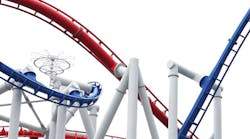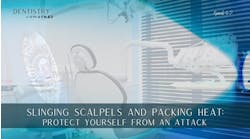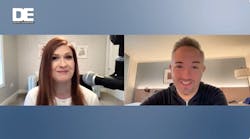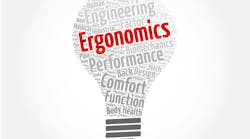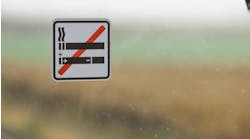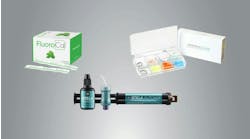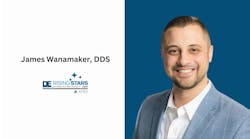Secret number one: great communication skills
Bruce B. Baird, DDS
Don't get me wrong, I love an occasional rollercoaster ride. But do you want to live your entire professional career between moments of sheer terror and exhilarating joy?
Like it or not, this is how most dental practices are managed. One month production numbers are up, and the next month they are down. As a practice owner your thoughts go from "My team is great; we are doing well" to "How will I ever make payroll?"
There's a better way! Trust me, I lived this life for the first half of my 35-year career. In my frustration, I expanded my outlook and began studying communication, connection, budgeting, and productive scheduling. I went from $400 an hour in 1998 to over $3,000 per hour today. The average tenure of my team is 13 years, and we have a lot of fun taking care of our patients.
If I can do this in Granbury, Texas (population 6,600), with 35 other dentists competing with us, you can do it in your area. The first building block of a predictable practice is to learn how to communicate for connection-not education!
Are you an engineer or non-engineer?
As a profession, we are taught clinical excellence and the task of working with our hands in this tough environment. Given the detailed nature of our business, dentistry tends to attract engineer personalities. Our communication challenge is that our attention is in the details of the mouth and not the details of the person.
I often joke there are only two types of people in the world: engineers and non-engineers. Engineers want to know the molecular structure of titanium; non-engineers just want to trust you. I estimate that 80% of the dentists in the country are engineers and 80% of their patients are NOT-thus the communication gap!
In 1985, my first full year of private practice, we did $1 million in production. You'd think I had it made-wrong! I was running behind all day, most patients were only accepting minimal dentistry, and my overhead was 96.8%.
My communication challenge was that I was a "non-engineer" dentist in a town with a nuclear power plant as the primary employer! Most of my patients were, literally, engineers. They had silly questions (in my mind) like, "What material will you use to fabricate my crown?" They wanted every detail and I was too busy to take the time to explain things. My frustrated response was one I learned in dental school: "Don't worry about a thing; it won't hurt and my lab guy is great."
Naturally, most patients left telling the scheduler that they would think about it or check with their spouse and get back to us. Aaargghh! I was going to the best clinical courses on implants, prosthetics, and surgery, yet I couldn't get patients to say yes to my recommendations.
I began reading everything I could on communication skills and influence, hoping that it would help me with my patients. Once I learned that engineers won't say "yes" until their questions are answered, things started to change. I began going into detail and answered all their questions. Because I like the details of dentistry, I found it wasn't as hard as I thought to get engineers to say "yes."
That's when I also realized why my dental buddies were struggling. They were engineers and 80% of their patients were not. They were boring patients with details and not connecting on a human level.
Productive dentists understand that everything begins and ends with a personal relationship with the patient. When you connect with a wide audience and take genuine interest in their well-being, then you can let go of the stress of "case acceptance."
The reality is that only one in three of my patients accept the full treatment plan the first time I present the case. The thing that got me off the rollercoaster, the real difference maker, is that I'm okay with that. The "one" that accepts is likely a $30,000 to $40,000 case. The others are quadrant dentistry or may need to take care of perio issues prior to restoration. My patients know that we have a plan, and whether it takes four months or four years to completely restore them to health-we are going to be in a relationship. This mindset can be tough for "engineer" dentists.
What can an engineer dentist do to improve communication skills? Here's the answer: become a student of communication, sales, and relationship building. Read books such as The Challenger Sale by Matthew Dixon and Brent Adamson, Unselling: Sell Less to Win More by Peter Bourke, and It's Not All About Me by Robin Dreeke.
The common thread in all these books is to "link" with others: find common ground and take a genuine interest in the person, not just their dental needs. Create a one-act play that you repeat time and again with each new patient. Here's mine:
I enter the treatment room and concentrate first on the person, not the mouth. I make great eye contact, smile, and shake hands. No mask hanging on my chin, no chart in my hand, no looking at the X-rays on the monitor. I focus on the person. I open conversations by always asking these three questions:
"How long have you lived in Granbury?"
"Where did you grow up?"
"Where did you move from?"
These questions help the patients start sharing about themselves. With each thing I learn, I open conversations about anything that I've heard that we have in common. I use techniques such as matching and mirroring and active listening to build three to five "links" to an unbroken chain of friendship and trust. This typically takes about five minutes.
I then ask the patient, "How can I help you?" Once you've built a relationship of trust, they will open up and share so much! Compare this to the engineer approach: "open wide" examination, present needed treatment, and ask, "Do you have any questions?"
Spotting engineers vs. non-engineers
My team schedules about an hour per new patient in my chair, so I have to be time efficient. Knowing ahead of time whether you have an engineer or non-engineer is critical. I've taught my team to spot the differences.
Remember, engineers have lots of questions regarding material selection. Enjoy being the engineer you are by teaching them and having fun. (Efficiency note: set a mental clock of about 10 minutes to help your team stay on time. If you need more time, the engineer will gladly come back for a consultation, after you've studied the case in further detail.)
Non-engineers' primary questions deal with the cost of care. You'll notice that they will be nodding in affirmation as you talk about their teeth. Don't become tempted to "educate" these people about the details. They like you and want you to do their dentistry. Don't confuse them! Just smile and tell them that your assistant has been with you for years and she will go over the costs, time involved, and find a way for them to get this treatment done. As you are leaving the room, give them a big smile and tell them that it was a pleasure meeting them.
Getting off the rollercoaster
This first segment serves as a foundation to help you get off the thrill ride and into predictability in your career. Connecting with all patients and learning to communicate with your team are the highest skills a productive dentist can learn. In the next segment, we'll dive deeper into treatment planning. You'll discover how to take the initial connection into extreme trust and lasting relationships.
Bruce B. Baird, DDS, has been named one of the nation's most productive dentists. Comprehensive treatment planning and full-mouth restorative care set him apart in the Dallas-Fort Worth area. In 2004, Dr. Baird founded Productive Dentist Academy and partnered with Vicki McManus, RDH, in 2005. He is also the founder of Comprehensive Finance.
